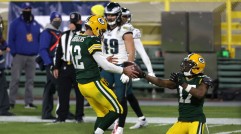Univision World Cup: Spanish-Language Chanel Beats ESPN & ABC but Future Remains Uncertain in Media Market
Univision spent half a million dollars in order to successfully beat its English-language competitors, ESPN and ABC, for World Cup viewership.
The money was used to fund new technology that allowed the company to broadcast the games a few seconds faster than both ESPN and ABC, according to The New York Times.
"Who doesn't want to yell, 'Goal!' five or six seconds before their neighbors?" president Juan Carlos Rodriguez said.
But the increase in viewers is only a part of the success. The tactic to attract attention came at a time when the company has been in talks of a possible sale to large media owners like CBS and Time Warner.
Univision is worth $20 million, a price some say is high for a Spanish-language channel.
"We're seen as a Spanish-language broadcaster that mostly competes with Telemundo," the chief executive, Randy Falco, told The New York Times. "But in my view, we should be competing with the English-language networks because increasingly we will have an audience that will surpass them."
Telemundo is owned by Comcast and was, therefore, for the first time, able to outbid Univision for the next two World Cups, which Univision has held onto since 1972.
Univision began in 1955 in San Antonio as a local station but is now a large network based in New York.
It has seen an almost 60 percent increase in viewership this World Cup because some viewers prefer to watch the game with the Hispanic commentators, who are more enthusiastic and their cries of goal are more exciting than their American counterparts.
But some other factors contributed to the increase in viewership.
Univision offered free streaming on its website, which allowed those stuck in offices during the games to watch, and the Hispanic American population tuned in in larger numbers because of two teams that did surprisingly well -- Costa Rica and Mexico.
The popularity of Univision during this World Cup is further proof of the growth of the Hispanic population, which has only been evident while discussing voting and employment in the country.
But the media company wrestles with an uncertain future -- fighting competition from two directions.
"Univision speaks to that immigrant and post-immigrant generation, which is both their great advantage and their limitation," said Alberto Vourvoulias, the former managing editor of Fox News Latino. "Increasingly, as the dynamic shifts to a U.S. Latin market -- to kids who are centered on U.S. culture and debates -- then Univision becomes old school."
Subscribe to Latin Post!
Sign up for our free newsletter for the Latest coverage!
* This is a contributed article and this content does not necessarily represent the views of latinpost.com














